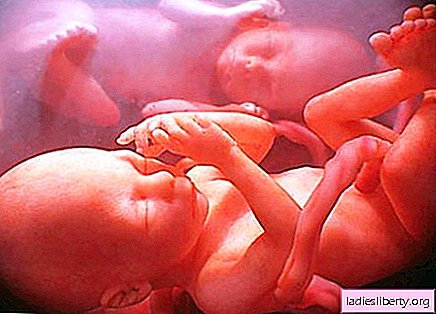
Multiple is called pregnancy, in which more than one fetus develops. After the birth of babies, depending on their number, twins are called twins, triplets, etc.
Gemini can be identical (monozygous) and opposite (dizygotic). It all depends on the mechanism of pregnancy. During fertilization and the subsequent division of one egg (zygote) into several, a monozygous pregnancy takes place, it ends with the birth of twins, which are called identical. If two or more eggs are fertilized, then a dizygous pregnancy occurs. In this case, two or more eggs can simultaneously mature in one ovary or in both.
In multiple pregnancies, a significant role is played by the time of separation of the zygote, which determines how much the twins will be separated from each other. If the separation time is up to three days of the existence of the zygote, then each twin is surrounded by two fetal membranes, and each has its own separate placenta. If the separation occurs later, then the placenta in the twins is common. If the separation occurs on the 13-15th day, then the Siamese twins are obtained. Moreover, it is far from always possible to determine the type of pregnancy during its course. Only one identical pregnancy can be recognized in the absence of a septum between the twins.
Dizygotic (heterogeneous) twins can be of the same or different sex. As a rule, they do not have such an amazing resemblance as identical ones, which are sometimes difficult to distinguish even to their own mother. Identical twins have the same blood type and papillary pattern on the fingertips; they are subject to the same diseases, which are often sick at the same time.
Causes of multiple pregnancy
If for animals a multiple pregnancy is almost always the norm, then in humans it is considered not to be a frequent occurrence. Its probability is determined by a number of natural factors: the age of the mother (the older the woman, the greater the likelihood), race (most often twins are born to African peoples, least likely to Asian) and the presence of multiple pregnancies in the family. In addition, today the use of modern reproductive technologies (such as IVF) is considered a factor that can contribute to the occurrence of multiple pregnancy.
Two-thirds of cases of multiple pregnancy ends with the appearance of heterogeneous twins. Most often, a dizygous pregnancy is caused by:
- stimulation of ovulation (enhanced functioning of the ovaries under the influence of hormones);
- hereditary maternal predisposition;
- Anomalies in the development of the uterus (two-horned uterus, the presence of an intrauterine septum);
- IVF;
- reception of hormonal contraceptives and their cancellation (rebound effect).
One third of cases of multiple pregnancy ends with the appearance of identical twins. The causes of monozygous pregnancy include:
- woman's age;
- delayed implantation;
- oxygen deficiency;
- violation of the ionic composition of the medium;
- toxic factors.
Diagnosis of multiple pregnancy
First of all, a multiple pregnancy can be diagnosed by a gynecologist on examination, based on the size of the uterus that does not correspond to the period of delayed menstruation indicated by the woman. With a multiple pregnancy, in the first trimester, the uterus has dimensions that significantly exceed those characteristic for a single pregnancy.
Ultrasound can tell more reliably about multiple pregnancy. Although it happens that at first the ultrasound shows two fetal eggs, but after the death of one of them, the next examination shows only one baby. Or, on the contrary, during the first ultrasound, one fetus is not visible after another.
The second trimester of multiple pregnancy is characterized by a sharp jump in the growth of the uterus, at which time the indicators of the height of its standing and the circumference of the abdomen exceed the characteristic for this period of pregnancy.
On palpation, the doctor identifies several heads and other large parts of the bodies of the babies, and when listening at two different points, he clearly hears their heartbeats (with a dumb area between them).
Complications with multiple pregnancy
A multiple pregnancy is considered to be a high-risk pregnancy, due to the fact that, compared with a single-pregnancy, the risk of complications increases.
First of all, it is the prematurity of the twins. The duration of a multiple pregnancy is determined by the number of fetuses: the more there are, the faster the birth. On average, for twins it is 37 weeks, for triplets - 33 weeks, for quadruples - 28 weeks.
A greatly enlarged uterus causes a diaphragm shift and a deterioration in heart function, which causes shortness of breath, heart palpitations, and increased fatigue.
Another consequence of a significant increase in the uterus, especially at the end of pregnancy, is compression of the internal organs. This leads to disruption of the intestines (constipation), increased urination, heartburn and varicose veins. A multiple pregnancy more often than usual leads to the development of gestosis with a protracted course and a more severe clinical picture.
Also, gestational pyelonephritis, polyhydramnios and the wrong position of the fetus develop more often compared with a singleton pregnancy. Due to the high demand for iron, iron deficiency anemia develops early. The presence of one large or several placentas causes low placentation and placenta previa. The risk of premature termination of multiple pregnancy is high, half of the cases end with preterm delivery due to uterine overstrain, feto-placental insufficiency, gestosis.
A multiple pregnancy also often results in incompatibility of the mother’s blood with the blood of the fetus, which threatens the development of hemolytic disease. The birth process itself may be complicated by an anomaly of labor forces, prenatal outflow of amniotic fluid, postpartum hemorrhage. Insufficiency of nutrients and oxygen causes a very low mass of twins, because of which intrauterine growth retardation can occur. The more fruits, the lower the weight of the twins at birth.
There are specific complications of multiple pregnancy in the form of transfusion syndrome of twins and the syndrome of the disappeared twin. Due to the intrauterine death of one of the fetuses, cerebral ischemia of the living twin can occur and, as a result, various neurological disorders.
Multiple pregnancy: what is important to remember
A woman carrying several babies should visit the obstetrician - gynecologist more often. If everything goes well, then, starting from the second trimester, mother should pay visits to the antenatal clinic every 10 days, and starting from the third trimester - weekly.
Due to the increased requirements of multiple pregnancy to the body, the expectant mother must very seriously take care of her condition. Such care consists in a carefully balanced diet, adherence to the regimen, intake of prenatal vitamins, prevention of possible complications, etc.
In the event of the slightest deviations from the normal course of pregnancy, a woman needs to be hospitalized. Also, the expectant mother of twins is subject to hospitalization, when 2 weeks remain before the term of the expected birth (even with a normal pregnancy).
Comments











